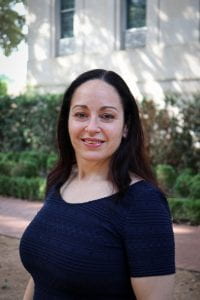By Abby Sowder, Public Relations Intern for Baylor Libraries
Hunger can indicate several things: an appetite, a desire, a yearning. Whichever a human experiences, hunger signals need for nourishment.
Dr. Lesa Scholl has travelled over nine thousand miles to study just that. After a one-month fellowship in 2017, Scholl returned to Armstrong Browning Library from the University of Adelaide in Australia to pursue her research on hunger and fasting as a three-month research fellow.
“Some say there’s a ghost that haunts the halls of ABL,” Scholl joked. “I think it specifically targets scholars to entice them to continue their research. On the last day of my first fellowship, I stumbled upon on a tract from the 19th century that inspired my current project.”
The tract, titled “Remarks on Fasting,” presented a dialogue between a physician and a clergyman discussing food restrictions. Interestingly, the clergyman was against fasting, and the physician was for it. Since her discovery in 2017, Scholl has identified the clergyman, and is “determined to find out” the identity of the physician.
This foundational piece led Scholl to explore the relationship between medicine and religion when it comes to fasting for religious or moral purposes. Scholl seeks to find what the body really needs, in a nutritional and a spiritual sense. It has been noted the science and religion fields fields have historically been at odds, but her work disproves that sentiment in regard to her field of research.
“There really is a strong conversation between the medical doctors and theologians. Instead of these two areas being separated, they’re working together,” Scholl said. “It’s an encouraging thing to see.”
Scholl’s research is focused in the 19th century from an Anglican viewpoint, but she uses contemporary words such as “food insecurity” and “food deserts” to help her modern audiences fully understand the subject matter. While her research is historically distant and is focused in another country, Scholl hopes her work allows her audiences to reflect on how it relates to the prevalent issue of hunger today.
“I think it’s much more useful for people to draw those conclusions themselves instead of someone telling them that they should think in a particular way,” she said.
Hunger is an issue that has affected societies for centuries, and it hits close to home in the Waco community, as 28 percent of its residents are currently living below the poverty line. In addition to her ABL fellowship, Scholl also serves as a research fellow for the Baylor Collaborative on Hunger and Poverty, which partners with the Texas Hunger Initiative to conduct research that determines the best practices and programs to effectively address hunger and poverty, and coordinates these efforts in local communities.
“The idea behind this fellowship isn’t really to have someone sitting up in the reading room and not connecting with anyone else. It’s about discovering ways to contribute beyond Baylor,” she said. “That’s one of the things I love about Baylor. We’re working to make the world a better place.”
Scholl will present her research, “Healthy Bodies, Healthy Souls: 19th-Century Medicine, Religion, and Literature,” at ABL’s annual Benefactors Day celebration on Friday, Nov. 15. The event begins at 3:30 p.m. and will be held in the Hankamer Treasure Room.


